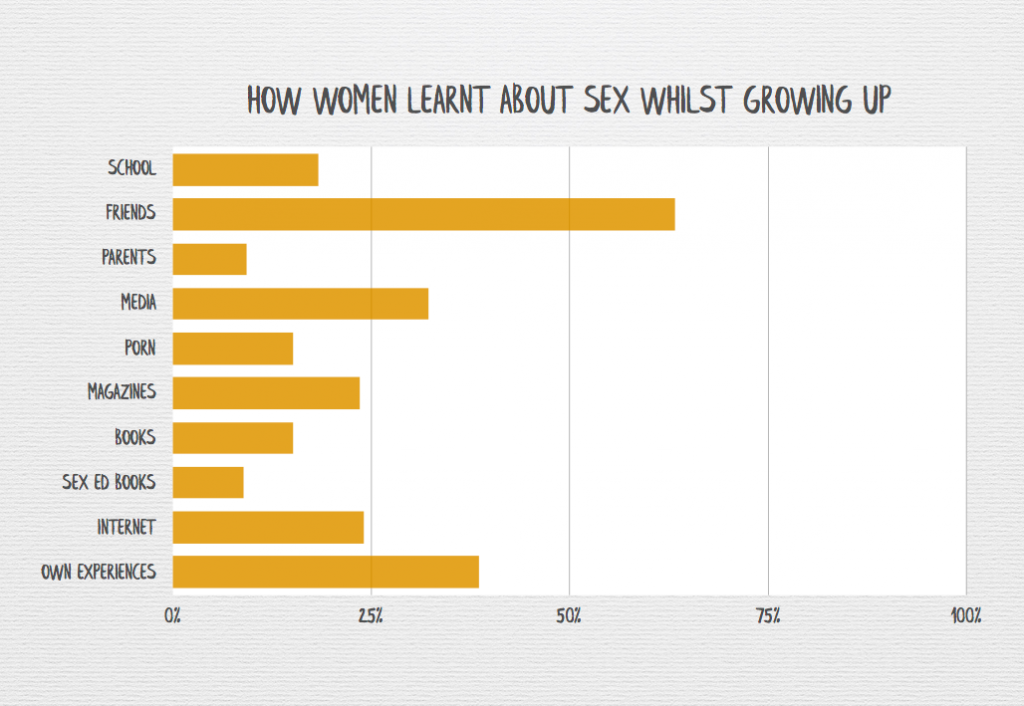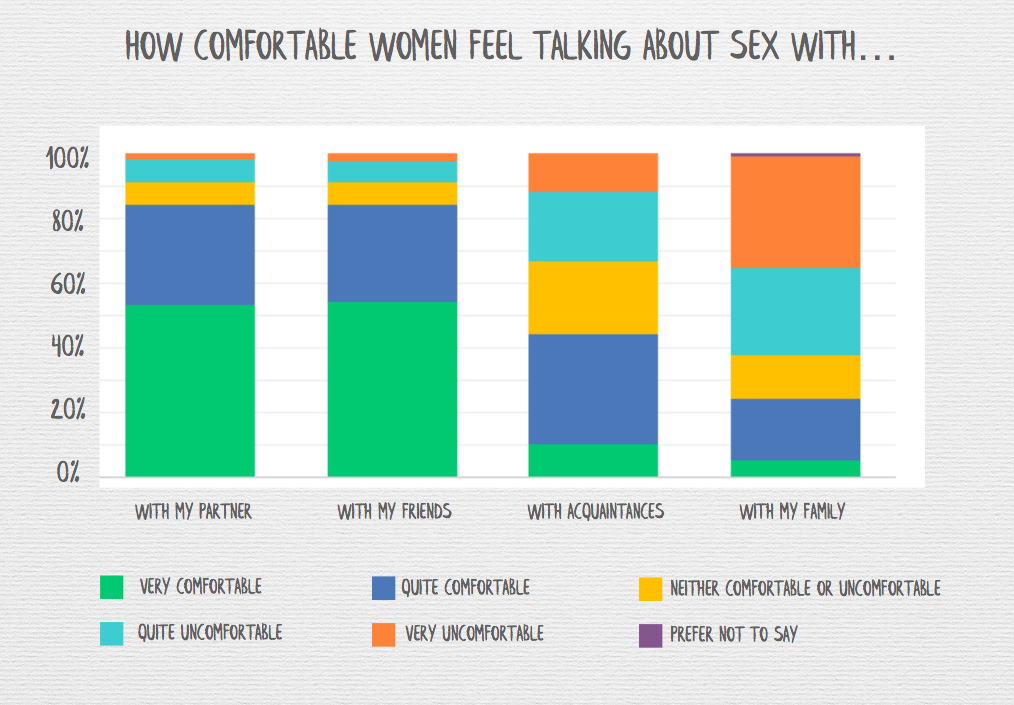It’s only sex: how do we break the stigma? Part 2

So why is it still so difficult to talk about sex openly?
In times of contemplation, I often turn to my survey results to see what my fellow sisters told me.
Nearly 550 women responded to my survey and here’s what they had to say about their sex education:

So. Most women learned about sex through their peers, their own experiences and from the media whilst growing up. By contrast, very few had realistic, educated resources – ie parents, schools, books – at hand to bestow wisdom upon them in their formative years.
The stats don’t surprise me, but they do bother me. Depress me even. It shows in black and white our society’s total reluctance to talk about sex. We are so awkward about sex that we can’t even stomach teaching our kids about it, preferring to let them blindly grope their way through adolescence. In my focus groups, women recalled being told to cover up as children, to sit with their legs closed or of being scolded for playing with their genitalia. Front bottoms, foo-foos, wee-wees and minis. These euphemistic nicknames pervaded our vocabularies, smacked with shame and a strange hush-hush secrecy. I understand that our genitals pass waste and therefore can be considered somewhat ‘gross’, but why should the use of the word vulva or vagina in front of a child be considered inappropriate? Children need to use the correct words to prepare them for adult life and to equip them with confidence and empowerment about their own bodies. And God-forbid a child is touched inappropriately ‘down there’ or feels any discomfort – that child will need the correct language to properly communicate their feelings and version of events. A twinging twinkle might not quite cut it.
As adults, sex and talking about it still feels very private, sometimes embarrassing. In fact, my survey shows that the majority of women feel highly uncomfortable talking about sex with anyone outside their ‘inner circle’, including their family:

Whilst I respect the argument that sex is personal – and that the personal is usually private – the pervading silence that surrounds sex does us a disservice.
I attended a ‘Pussy Circle’ this week hosted by the majestic Africa Brooke where we discussed our Inner Child and how many of us have internalised shame around sex and our bodies from a very young age. One of the women in the Circle remembered her father dancing in front of the telly whenever something ‘sexy’ came on, hiding its content from her – something that really resonated with the whole group! Secrecy breeds shame and shame feeds secrecy. It’s a cycle that needs to be broken in order to help us build the bridge between shame (our past) and empowerment (our future). One of the first things we can do to break the cycle is to recognise our conditioning by a society that deems sex as taboo (once you start looking you’ll see its effects are everywhere, like a mist surrounding us all!) Then, we can make the informed decision to be intentional with our language and our actions when dealing with sexuality. We can start by providing proper education to our kids and offering up shame-free spaces among young people and adults for honest conversations about sex.
Still not convinced? The pervading silence that surrounds sex, starting from childhood, logically means that there are no proper models available to us in how to talk about sex openly. If our schools aren’t educating us and our parents aren’t talking about us, it means that there is a total absence of socially acceptable language surrounding the topic. A vacuum is therefore created by our inability to talk openly about sex. And the language of porn has rushed in to fill it.
Cindy Gallop, my sex-positive hero, also came to this conclusion after having sex with lots of young men and observing their language and sexual behaviour:
When total freedom of access to hardcore pornography online meets our society’s equally total reluctance to talk openly and honestly about sex… it results in porn becoming by default the sex education today. In not a good way.
She continues, whilst speaking to Bryony Cole on the ‘Future of Sex’ podcast: The issue isn’t porn. The issue is the complete absence in our society of an open healthy honest conversation about sex in the real world. If we had it, among so many other benefits, it would also mean people would then bring a real-world mindset when they view what is purely artificial entertainment.
Cindy Gallop is now on a mission to make talking about and viewing real-world sex socially acceptable. She has launched ‘Make Love Not Porn’ – a platform much like YouTube where real people can share real videos of them having real sex. She terms this ‘social sex’ – a new category of online sex which is neither performative porn nor amateur porn. Rather, it’s a social platform that celebrates the reality of sex: real bodies, real language, real messiness, real silliness, real moves, real love and connection and intimacy.
It’s people like Cindy Gallop who are making huge strides to disrupt social narratives around sexuality and bash the shame out of sex. Sadly, as many of the sex-pos community are well aware of, creating change around how we perceive sex can be a huge challenge. Social platforms like Instagram enforce strict rules about ‘indecency’ which make it extremely difficult to spread positive messages about sex. Advertising bodies prohibit female-led ‘sex tech’ companies from marketing their product publicly whilst others can’t register their company names or officially administrate their finances. All of this makes it extraordinarily hard to innovate in this space. It’s this, on top of the male-dominated institutions and socio-cultural dynamics that have sought to repress female sexuality for centuries, that we are up against whilst we drive for change.
So how am I trying to break the stigma? It’s a small contribution, but by holding this space on G’s Spot and by encouraging frank conversations about sex, I hope to bring sex out of a shameful shadow and instead, embrace it as something natural and empowering. And you, dear reader, just by being here and showing interesting and reading this article, you too are helping to breakdown the stigma of sex.
***
Bronwen Bender – illustrator
www.brownwenbender.com / @bronwen.bender